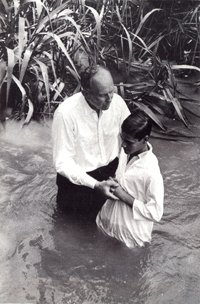LATIN AMERICA AND THE CARIBBEAN
BMS work in Latin America and the Caribbean has inlcuded work in Brazil, Ecuador, El Salvador, Haiti, Jamaica (see Jamaica section), Nicaragua, Paraguay, Peru, and Trinidad and Tobago.
The first couple sent to Brazil was Arthur and Kathleen Elder who had previously worked in China. In 1953 they left England to carry out ‘pioneering evangelistic work’ alongside Brazilian Baptists, settling in Ponta Grossa. The church there was already growing quickly and consequently was in urgent need of trained pastors; the Elders were soon joined in their work by further couples sent out by BMS.
In the 1950s BMS work in Brazil was almost solely evangelistic and church-based but in the following years agricultural and medical work was developed. By the 1990s there were over 60 mission personnel in Brazil working with State Baptist Conventions throughout the country in wide ranging ministries, in both rural and urban settings. These included children’s education, church planting, pastoral and mission training, development through micro-enterprise, church and community mobilisation, and sport, amongst others.

From the late 1990s the number of mission workers in Brazil decreased as the work was handed on to the national church, until the last BMS mission workers in Brazil finished in 2014. Since the turn of the century the strong relationships developed with the Brazilian Baptists have led to an increasing number of joint mission ventures with the Brazilian Baptist World Mission Board (JMM) in other parts of the world.
At the outset of the 21st century BMS work in Latin America initially expanded to Paraguay, Ecuador and Peru, particularly in ministries of church planting, Pre-school Education Programmes (PEPEs), community development and church leadership training. More recently this had consolidated to working solely in Peru, with a strong BMS team cooperating with the Peruvian Evangelical Baptist Convention (CEBP) in community development, leadership and mission training.
